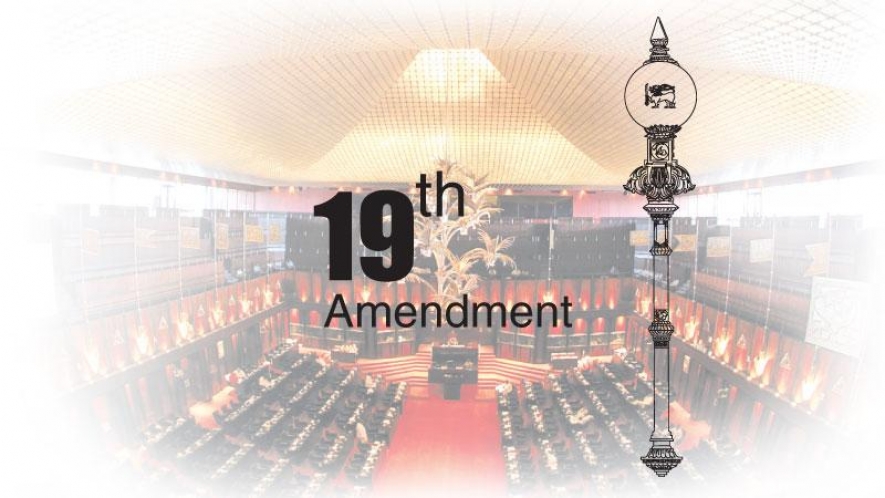The Government of National Unity reached its third year mark last week, with a mixed scorecard. But where it has show unambiguous progress and real political will these past three years, has been in the realm of democratic reform, one of the keystones of the January 8, 2015 platform that propelled President Maithripala Sirisena and subsequently Prime Minister Ranil Wickremesinghe to power three years ago.
The Government’s singular achievement in this respect came only months into its term, with the passage of the 19th Amendment to the Constitution. The 19A, as it is called, repealed the draconian 18th Amendment which removed a two term limit on the presidency and brought previously independent commissions under the jackboot of the executive, was probably one of the most progressive pieces of legislation passed in the history of the republic. In addition to slashing the powers of the Presidency and the de-politicisation of state institutions, which was a central pledge of President Sirisena’s election campaign in January 2015, the 19A enshrined the Right to Information as a fundamental right in Sri Lanka’s constitution. The amendment restored independence to major commissions including the National Police Commission, the Human Rights Commission, the Bribery Commission, Elections Commission and the Public Service Commission after their long winter of being rubber-stamping authorities or appendages to an all powerful executive, especially during the tenure of the former Rajapaksa regime.
Independent Commissions were first introduced through the 17th amendment to the constitution in 2001 to reduce unfettered executive discretion in respect of the functioning of these bodies in the public sector.One year after the passage of the 19A, the Government made another historic move to enact the Right to Information Act with the objective of making people more accessible to information that may affect them in some way and in a step towards democratisation and reducing corruption.
“Whereas the Constitution guarantees the right of access to information in Article 14A thereof and there exists a need to foster a culture of transparency and accountability in public authorities by giving effect to the right of access to information and thereby promote a society in which the people of Sri Lanka would be able to more fully participate in public life through combating corruption and promoting accountability and good governance,” the preamble of the RTI act says.
Speaking of the successful application of the Right to Information Act and how it has impacted the rights of the people attorney at law, Kishali Pinto- Jayawardena who is a commissioner at the RTI Commission told the Sunday Observer that the thrust of this legislation had always been to privilege people.“The basis for this is that the state is far more powerful. When structuring the RTI all along the objective was to privilege the citizens make it as easy as possible for citizens to get information,” she said.Transparency International Sri Lanka calculates that the RTI commission has had a 90 percent success rate.
However, further calling for systemic protection for the independent Commissions legal expert and Commissioner Kishali Pinto Jayawardene went on to state that it has become evident that the success of these commissions is more dependent on the individuals who drive it, which should not be the case.“This means consequentially once the individual leaves the body collapses. This systemic protection is not given to the commissions even from 2015,” she said.There is also the need to ensure that the commissions are given sufficient financial independence. A sufficient financial resource is paramount. In fact most of the commissions have complained about this.
The Bribery Commission has also been unfettered and enjoyed the fruits of independence, as it cracks down indiscriminately on corruption within the state sector. Earlier this year, the Commission bagged a prize catch, when it apprehended the Chief of Staff to President Sirisena in the act of obtaining a bribe amounting to Rs. 20 million. Commission officials said they had been able to carry out their investigation and sting operation without fear or fervor, and with no interference from the highest levels.
Another legislative victory that the government bagged within the three years is the passing of the Office of Missing Persons Act, with a lot of drama and unfounded opposition.The Office of Missing Persons has had successful discussions around the country especially based in the south and the north. It will be issuing its first interim report by August 30.
In its efforts of reconciliation the government has been steadily and in a meaningful way is reducing the military footprint in the North. In keeping with the government’s pledge according to Army statistics the it has released over 80 percent of the lands that were under the military control including over 90% of the private land in Jaffna, Kilinochchi, Mullaitivu, Vavuniya, Mannar, Trincomalee, Batticaloa and Ampara, which were given back to the original owners.




















